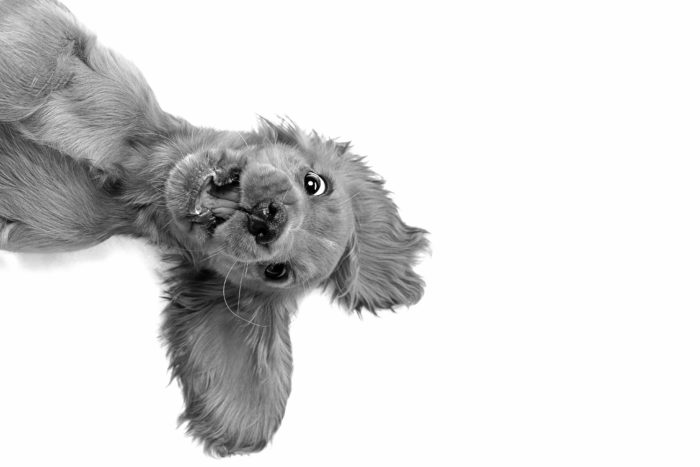so· cial· i· za· tion
Pronunciation: sō-sh(ə-)lə-ˈzā-shən
Function: verb
Exposure of a young domestic animal (such as a kitten or puppy) to a variety of people, animals, and situations to minimize fear and aggression and promote friendliness.
Socialization is the process of developing positive relationships with other people and animals. Preparing the puppy to be comfortable in the world he must navigate.
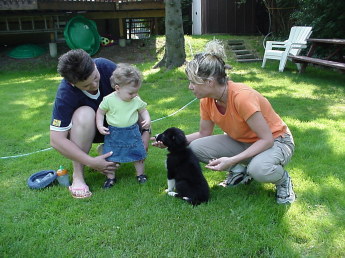
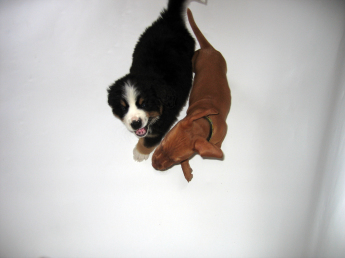
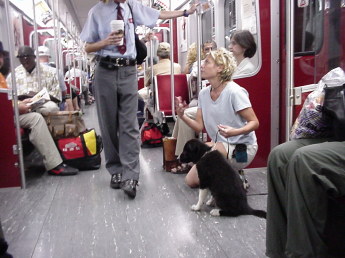
As all animals develop, there are numerous stimuli (smells, sights, sounds, and events) that can lead to fear and anxiety. Habituation is the process whereby animals become familiar and comfortable with repeated stimuli, thus not reacting to them in a negative manner.
Localization is the process by which animals develop an attachment to particular places. For the purpose of this site, we include habituation and localization when we speak of socialization.
As adults we all know how difficult changing our own behavior or beliefs can be. We were socialized by our parents and other sources of influence while growing up. Through exposure we became comfortable in certain situations, with certain customs, and with certain sights, smells, and sounds.
Things that we have not been familiarized with can still be somewhat of a shock. The unfamiliar can make us feel uncomfortable or can just plain take some getting used to. If you live in a quiet rural area and then have to spend the night in a noisy city, you may not be able to sleep. When you are used to having the steering wheel of your car on the left side and then go to Europe and it is on the right, it can be very disorienting. What if you live in a warm climate and move to a climate with frosty cold winters? It takes some getting used to.
Puppies can learn to be comfortable with different people, sounds, and situations that come their way if we carry out thorough and proactive socialization. The early weeks together provide a unique opportunity to work with your pup when they are more likely to form positive associations with novel things.
Our understanding of this sensitive period of development continues to expand. As we learn more we can continue to refine our approach to raising pups with the main goal of raising resilient, curious, and social canines. This is not a newfangled idea but rather a scientific theory that has been researched, studied, and known about since the 1930’s. It is important information for anyone raising a puppy to understand and attend to.
“The problem the domestic dog has is that it needs to become familiar with an enormous number of stimuli in a very short time so as to be able to live in and cope with the diversity of our world.” 2
When a dog is uncomfortable with something or someone he may behave in one of two ways: he may act to get away from the thing (flight) or he may act to get the thing to go away (fight).
Millions of dogs are put down each year due to preventable behavioral problems.
“One in five of the dogs that Dr. Valerie O’Farrell (1986) studied while conducting research at Edinburgh (Royal Dick) University Veterinary School had a behavioural problem to a lesser or greater extent. A similar, but larger, American study fixed the figure at one in four. In one year my practice treated 773 dogs – 79 of them, that’s 10 percent, had problems of fearfulness towards people or the environment due to a lack of early socialization or habituation and a further 4.5 percent were inept at relating to other dogs, again due to a lack of early socialization. The problem is immeasurably greater than these figures suggest. Many dogs show a weakness of temperament or inability to cope when faced with a particular situation, without their behaviour becoming problematical enough for the owners to seek help from a behavioural counsellor.” (See source.)
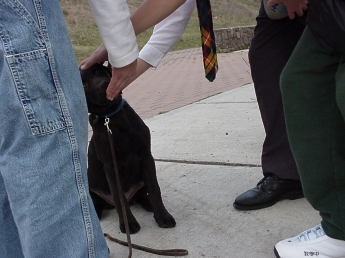
Once a dog has passed his Socialization Period (see Your Puppy’s Development) it does not matter that a dog has not had a negative experience with a particular stimuli. He may treat any unfamiliar stimuli as potentially dangerous to his well-being. Our dogs have this built-in mechanism passed down to them from their ancestors in the wild. It ensures protection of baby animals from natural hazards in their environment.
The dog that has not been well socialized may become the epicenter in a storm of problems. Dogs can get ill from stress. This can inhibit their ability to learn or even cope. This may lead to serious health and behavioral issues. Scared dogs may bite, or seem unpredictable or unmanageable. This is often too much for an inexperienced dog person and the dog ends up being relinquished to an animal shelter.
Think about a reality that involves a dog that bites (children, other dogs, and adults). What about a dog that growls and lunges at someone with a different ethnic background? Imagine your dog chasing or jumping on someone in a wheelchair or a walker. How would you feel if your dog bit and injured another dog?
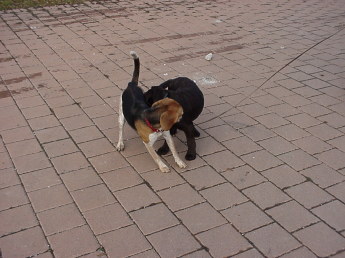
The good news is twofold. First, more and more people are familiarizing themselves with this information, including breeders, vets, and trainers. Second, you have a new puppy versus an adult dog so the golden opportunity is in the palm of your hand.
Neutral exposure is not enough. How you socialize your puppy will make all the difference.
You must be thoughtful and strategic in your approach.
Make socialization a priority. Turn each opportunity of meeting someone or something new into a positive experience for the puppy with treats, toys and fun.
If your puppy is comfortable, people he meets can give him a treat (supplied by you). If your puppy is experiencing someone from a distance you can feed him. Set up a positive experience for the pup while meeting or experiencing all types of people. The puppy should never be forced to meet or be petted by anyone he is not interested in interacting with. Avoid luring him toward a person or situation that he’s not comfortable with. Avoid letting anyone pet him when he’s in your arms and unable to move away should he want to.
Seek out novel sights, sounds, and situations to introduce your puppy to. Check out our 5 Super Duper Socialization Resources. Use the Social Schedule for inspiration. Print it out, refer to it frequently, and start to check things off the list.
1: Websters New Twentieth Century Dictionary, 2nd ed.(New York:William Collins + World Publishing Co., 1977)
2: Puppy Socialization By David Appleby

